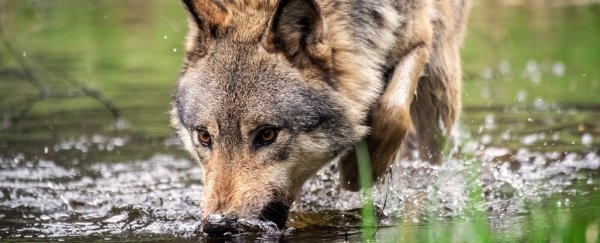US President Donald Trump's administration on Thursday removed endangered species protections for the gray wolf, paving the way for the iconic predator to be more widely hunted.
The move was slammed by conservation groups, which said that while wolf numbers have partly recovered since the animal was first listed in 1974, they remain "functionally extinct" in the vast majority of their former range.
"Today's action reflects the Trump administration's continued commitment to species conservation based on the parameters of the law and the best scientific and commercial data available," said Interior Secretary David Bernhardt.
The department added in a statement that the gray wolf population in the lower 48 states is more than 6,000, "greatly exceeding the combined recovery goals for the Northern Rocky Mountains and Western Great Lakes populations."
Placing wolves under state control will allow Minnesota, Michigan and Wisconsin to resume hunting and trapping, activities blocked by a 2014 court ruling.
All three states are considered battlegrounds in the November 3 election between Trump and Joe Biden, and the president has sought to appeal to rural voters such as hunters and livestock owners.
A once highly-feared apex predator, the gray wolf was eliminated across much of the United States by the 1930s through government-sponsored hunting, trapping and poisoning programs.
But numbers have increased thanks to protections under the Endangered Species Act.
Conservationists argue however that the move to de-list them is premature and wolves have only re-occupied 15 percent of their former range.
"This is no 'mission accomplished' moment for wolf recovery," said Kristen Boyles, an attorney for Earthjustice, which called the decision "illegal" and said it would sue the government.
"Wolves are only starting to get a toehold in places like Northern California and the Pacific Northwest, and wolves need federal protection to explore habitat in the Southern Rockies and the Northeast.
"This delisting decision is what happens when bad science drives bad policy."
Last year, 1.8 million Americans wrote comments against delisting when the rule change was proposed.
It has also been opposed by 86 members of Congress, and 100 scientists wrote a letter urging the government to reconsider.
The science behind the rule change was also disputed by experts in a peer-review report commissioned by the Fish and Wildlife Service itself.
British scientist Jane Goodall said in a video message: "Wolves have all the sentience, and emotions, and intelligence perhaps more so than dogs.
"How would you feel if your dog was caught in a leg-hold trap, suffering for hours in agony? How would you feel if your dog was shot, so that its head could be mounted on somebody's wall?"
Currently only four states - Alaska, Montana, Idaho and Wyoming - allow the public to hunt wolves.
